- Home
- Connie Shelton
Small Towns Can Be Murder Page 3
Small Towns Can Be Murder Read online
Page 3
The reception desk was a half oval of neutral beige Formica. It was cleared except for a six-line telephone, and a few mandatory office supplies such as stapler and tape dispenser. Oh, and the Dunkin' Donuts box and her coffee cup.
"May I help you?" she asked.
Since she was obviously not overloaded with work, I decided a cozy chat might be the best approach.
"They dragged you out pretty early for a holiday, huh?"
"Yeah, we switch off shifts for that. I'd lot rather do Fourth of July than Christmas, though. Jenny drew Christmas this year. It's the pits, I'll tell you. Every little kid who gets a new bike manages to fall off it on Christmas day. I drew it last year. I swear, we had a cracked wrist, two broken fingers, and at least four bumps on the head that day.
"I'm sorry," she continued, "that's not what you came in for. It's just that neither of you look like a medical emergency. If you need to see the doctor, you just missed Dr. Fisher but Dr. Phillips is in. He's not busy." She looked past us to the bank of empty waiting room chairs.
"Oh, no, Miss Smith," I assured her.
"Call me Chris," she said. "We're real informal here."
"Okay Chris." I gave her a real informal smile. "Neither of us has a medical problem. Actually, we were friends of Cynthia Martinez. We were so shocked to hear about her death. She was a patient here, wasn't she?"
"Everybody in town is," Chris answered.
"What happened, anyway?"
She hesitated a fraction of a second, glancing toward double doors that led to the innards of the clinic. There had been no sound or movement from that direction since we'd arrived.
"She had a miscarriage, and died of extensive hemorrhaging."
"Isn't that kind of unusual nowadays?" I asked. "I mean, with modern technology and all?"
"Well, she was a little old to be having her first baby," Chris replied. She paused, realizing how that sounded. "I mean, she was older than most of our maternity patients. And she was already into her fourth month before she came in. Most of them are here the minute they suspect they're pregnant."
"She'd been pregnant once before, hadn't she? About a year ago?"
Chris wrinkled her eyebrows just a bit. "Yes, I think so. I don't remember that too well."
"Was she in here often? For other things, I mean."
She started to roll her chair backward toward the cabinets where the patient files were kept, but quickly realized that would definitely be breaking a confidence. "I really can't talk about a patient's medical history, you know."
"Oh, I know," I said, pretending that had been the furthest thing from my mind. "I wouldn't want you to do anything wrong. We were just worried about Cynthia." I dropped my voice to a murmur. "Another friend who worked with her told me she thought Cynthia's husband was abusive."
"Well, I can't come right out and confirm that," she murmured back at me, "but..."
The door from the inner hallway swung toward us just then, startling her into silence.
"Chris, I need... Oh, sorry. I didn't realize anyone was here."
The doctor was a good-looking man in his early thirties, about five-eleven, with curly brown hair a little on the longish side. He wore tortoise rimmed glasses. His white shirt was open at the collar, his tie loosened, the sleeves rolled up to reveal tan arms with a light growth of hair on them.
"Rod!" Sally exclaimed.
"Sally McConnell?" He lowered his clipboard, and looked over the tops of his glasses at her.
"Well, it's Sally Bertrand now," she answered. "It's good to see you. You're here in practice now?"
He nodded, rocking slightly back on his heels. Then he glanced over at me.
"Oh, I'm sorry," Sally said. "This is my employer and friend from Albuquerque, Charlie Parker."
We shook hands. He had attractive brown eyes and a slight gap between his front teeth.
"Come on back," he invited. "We're not exactly overflowing with patients this morning, although later I expect the usual abundance of burned fingers and toes from the fireworks."
We passed several examining rooms before another hall branched off to the right. A sign indicated surgery. Probably minor out-patient procedures. Straight ahead was a closed door with the name Evan Phillips, MD on the door. Rod indicated a door on the left. His name was on it in the same gold letters. Across the hall from Rod's was another closed door—Brent Fisher, MD.
Medium brown commercial grade carpeting covered the floors in the halls and his private office. His furnishings consisted of a large desk with comfortable high backed chair, two side chairs, a wall of bookcases behind him, and a sofa against the far wall. All the upholstery was done in earth tones, popular about ten years ago. His walls were hung with framed diplomas, and a couple of southwestern art lithographs done by nobody famous. A framed photograph of a wife and baby stood on the bookcase, just at visitor eye-level when seated.
He apologized for the desktop, which was littered with files. He made an effort to straighten them while Sally and I sat down in the two beige side chairs.
"So, you're married now, living in Albuquerque, and what did you say you do?" he asked Sally.
"I work for Charlie and her brother. Charlie and I decided to take the holiday off and drive up here yesterday. That's when we heard about Cynthia Martinez."
"Oh, you knew Cynthia?"
"Well, not exactly. She was a co-worker with a friend of mine, Laura Armijo. We were at Laura's house yesterday when she got the news. She was very upset."
"Naturally. It was tragic." His voice was sympathetic.
"Laura thought Cynthia might have been an abused wife," I said. "She had seen a few suspicious instances."
"Well, of course, as her doctors, none of us could comment on that."
"But shouldn't the police be brought into it if her death might have been caused, even indirectly, by abuse?"
"We have no reason to believe that it was. The people at her office called an ambulance Friday afternoon. She had severe cramping and bleeding. I met them here but she lost the baby right away. The bleeding was so severe that I didn't feel it was possible to transport her to a larger hospital. I did all I could for her."
Sally was looking pretty white by this time, and I didn't want to frighten her with any more graphic details. But something about the explanation didn't sit right with me. Santa Fe was only thirty minutes away. Surely an ambulance driving full bore could have gotten her there in time.
I wanted to ask a few more questions, but Rod Phillips' face had closed down. He suddenly had something to do with the files on the desk. He stood and held his hand out, clearly dismissing us.
"Sally. Good to see you again." The friendly brown eyes had become cold. "Charlie. Nice to meet you."
Why did he want to protect an abuser? I knew that doctor-patient confidentiality was practically sacred, but I was also pretty sure that if a doctor knew a crime had been committed, he had to report it. What was going on here? Maybe Rod Phillips was a good friend of Richard Martinez, and was turning his back on the obvious evidence.
Back in the car, I turned to Sally again. Her color was coming back slowly.
"Well," I said, "that didn't get us very far."
"That poor woman." Sally's voice was shaky.
"Hey, don't you worry," I said, patting her hand. "It's not going to happen to you."
I hoped I sounded convincing.
Chapter 6
We stopped back by Laura Armijo's house, but found no one home. I wrote a quick note on the back of one of my business cards, telling her we'd had no luck, but to call me if I could help. I stuck the card in her mailbox.
It was almost noon, and we had decided there wasn't much else we could accomplish here. We checked out of the motel and hit the road. Traffic between Valle Escondido and Santa Fe wasn't bad. It was still early in the day. I treated Sally to lunch in Santa Fe at one of those trendy touristy places with rip-off prices. The atmosphere was nice, though, and we took our time. By the time we each polis
hed off a slice of cheesecake, she was able to laugh again, although I sensed a certain anxiety to see her husband and hold onto him.
The temperature in Albuquerque was still over a hundred degrees when we arrived at four o'clock. Even with the air conditioning running full blast, we could feel it. The roadways looked wavy in the heat, and bright white glared off the windshields of oncoming cars. Coping with it tired me out.
I dropped Sally at her house in the northeast heights, then headed across town to my place. I live in the old country club section of town, near historic Old Town. It's the house I grew up in. I have the same neighbors, the same lawn, the same trees that I've always known. The homes aren't fabulous by today's standards, but I like the familiarity and comfort of the place. The ride across town took about twenty minutes. By the time I pulled into my own driveway, I was more than ready to hug my dog and kiss the ground.
Since my only baggage consisted of the newly purchased toothbrush and t-shirt, I stuffed them into my purse and walked around the side of the house. Rusty would either be waiting in the backyard, or next door at Mrs. Higgins’s. I didn't get accosted as I entered the side gate, so I walked through the break in the hedge to my neighbor's back porch. She must have seen me coming, because the door opened and all sixty pounds of Rusty bounded out.
He covered my hands with lovely doggy kisses, then leaned against me so hard I thought we'd both fall over. I'm not sure exactly what breed of dog Rusty is. He has the build of a Lab and the color of an Irish Setter. He smiled at me with that special grin of his that makes most people think he's snarling.
"Hi, Charlie, good to see you home." Elsa Higgins waited in the doorway. "Want to come in for a glass of tea?"
I wanted to kick off my shoes and have a shower, but felt a little guilty that I hadn't spent too much time with my elderly neighbor recently. Especially when I frequently called on her for favors.
Rusty stayed close at my heels as I climbed the two steps to her back door. The kitchen was overly warm, and smelled of vegetable soup. I could see a large pot steaming on the back burner.
"I've got some tea made right here," she said, "and it will just take a minute to put ice in these glasses."
Two glasses waited on the worn counter top. She'd obviously been planning this little social visit. Though she seems to stay busy all the time, I know she loves company. Even a small event like sharing iced tea meant a lot to her. I needed to spend more time with her.
Elsa Higgins, ‘Gram’ as my brothers and I call her, had lived alone almost as long as I could remember. Now eighty-six, she had been widowed twenty-some years ago. Mr. Higgins was a dim memory for me, a white-haired old man who used to putter in the garden a lot. He’d been long gone by the time I moved in with Gram after my parent’s untimely death. She, too, had been gray for as long as I could remember, but age hasn't put much of a damper on her. She's feisty and opinionated, and I want to be just like her when I grow up.
She scooted to the freezer, where she pulled out an old metal ice tray. A couple of cubes flew upward as she wrestled with the ancient thing, trying to loosen the batch.
"Here, let me try that for you," I suggested.
She seemed glad to let me have it. I didn't have a lot better luck at first, but eventually extracted enough cubes for two glasses. Why did she fight this old relic when the new plastic trays were so much easier? Maybe I'd pick up a couple for her on my next trip to the store.
"Why don't we go in the living room?" she asked. "This kitchen's hot with that soup kettle going. I don't know what I was thinking on a hot day like this."
Rusty followed us into the cooler part of the house. Her house is about the same size as mine—three bedrooms, living room, dining, kitchen, two baths. She seems to live in two rooms, the kitchen and living room. I don't know what she does with the rest of the space. It's full of stuff, though, I've seen that much. All her furniture is vintage 1940s, and hasn't changed since my earliest childhood recollections. She even has crocheted antimacassars on all the chairs and sofas.
A large brown rocker is Mrs. Higgins favorite chair, so I opted for the sofa beside it, setting my iced tea on a coaster on the coffee table.
"Did Rusty behave himself last night?" I asked.
"Oh, sure. He's always a good boy."
The subject of the conversation raised his head, knowing we were talking about him. Elsa gave him a sweet smile, and he thwapped his tail against the floor. When he realized that neither threats nor treats were forthcoming, he returned to his stretched out position.
"Thanks for taking care of him on such short notice." I went on to explain how it happened that Sally and I stayed overnight in Valle Escondido.
"We left the whole thing kind of unfinished," I told her. "I'm not sure whether I'm expected to do anything more or not. I mean, no one really asked us to investigate. But then, there's a situation where a woman shouldn't have died, but she did."
"It sounds so sad," she commented.
A minute or two of silence passed.
"So, when does your beau arrive?"
"Thursday night. God, that's only three more days." Somehow the time had crept along for the last month, only to begin racing these last few days.
"Well, you bring him over here to meet me."
"It'll be late Thursday night," I told her. Somehow, after being apart two months, during which our phone conversations had become rather steamy, I didn't think visiting the neighbors would be first on our agenda. "I'll bring him over on Friday."
My iced tea was finished. Although it felt like I was cutting the visit with her short, I was weary from my travels, and ready to relax on my own soil. Rusty jumped up as soon as I stood.
"C'mon kid, let's get going."
The mailbox was empty. It was a holiday, after all. Rusty and I dined on instant noodles, the kind you pour boiling water over and wait for three minutes. I didn't have the energy for much else. A hot shower and fresh clothes felt good, and afterward I curled up on the couch with a book.
I had a hard time settling in with it, though. Drake would be here in three more days, and I kept noticing disorder around the house that should be cleaned up. Rusty and I rarely do major damage, but even the neatest people have to straighten up now and then. I finally set the book aside and picked up the feather duster. An hour later, the place looked much better. I would change the sheets and run the vacuum cleaner the night before he arrived.
I went to bed that night to the sound of distant bottle rockets whizzing through the air.
The sun came through my window early the next morning. After three days off, I was out of the habit of moving at this hour. However, Rusty wasn't. He got up off his rug at the foot of my bed and proceeded to lick my fingers until I stirred. I threw on a robe and let him out the back door, while I headed toward the bathroom.
Fifteen minutes later, I had donned a cotton shirt and pants, pulled my hair into a ponytail, and done my usual minimal makeup routine, consisting of blusher and lipstick. Rusty waited at the back door for breakfast, so I let him in. He had a scoop of nuggets in his bowl, while I poured yogurt over granola for myself.
We were on our way to the office before the traffic got bad. The office Ron and I share is only about a mile or so from home, in an old Victorian house. The neighborhood is in transition from residential to business, and has been that way for years. Except for discreet placards on the sides of some of the places, one wouldn't know it wasn't just a quiet residential area.
Ours is painted pale gray with white trim. A driveway beside the house leads to a parking area in back, beside the original carriage house. Inside, the old living room serves as a reception area, the dining room for conferences, and the kitchen is ... what else? Upstairs, the former bedrooms have become Ron's and my offices. There's a bathroom and storage room.
Since I practically live here, I've made my own office as homey as possible, with antiques, hanging plants, and an oriental rug. Ron has his own decor, consisting of a desk heaped with f
iles and papers. We limit his decorating freedom to that one room.
Mine was the first vehicle in the parking area. Rusty leaped out as soon as I opened the door, and proceeded to check the perimeter of the yard. I unlocked the back door, switched on lights, and started the coffee maker. Saturday's mail lay in a heap under the mail slot at the front door. I carried it upstairs with me. Rusty followed, his toenails clicking on the hardwood floors.
The coffee smell reached me, so I went back down, poured a cup, and took it upstairs to drink while I opened the mail. Sally came in a short while later. She peeked her head in my doorway to let me know she'd arrived.
"You look a little green around the edges," I told her. Actually, pale was more like it.
"Yeah," she said, weakly, "it took me half a package of soda crackers to get out of bed this morning."
Ugh. And she'd actually gotten into this condition on purpose. Not for me. No way. No thanks.
"Is something burning, or does the coffee always smell this strong?" she asked.
"No, this is how it always smells."
She looked like she might bolt for the bathroom.
"Sally, would you like to take some time off? I'm sure we could manage."
She took a deep breath, and a little color returned to her face. "No, I need to work. If I stayed home, I'd lie around all day and get fat."
"I hate to tell you this, but I think you're gonna get fat anyway."
That perked her up a little. She chuckled, but her normally infectious smile was wan.
"Seriously, we could rearrange your hours if you want. You could work afternoons instead of mornings."
"Let's see how it goes. This is the first morning I've felt really rotten. If it keeps up, I may take you up on the offer."
She took her mail and headed for her desk. I sorted mine into piles according to urgency. The first week of the month, my most urgent task is usually to make my general ledger entries and get the previous month closed out so we could begin billing the new month. Exciting stuff.

 Sweet Masterpiece - The First Sweet’s Sweets Bakery Mystery
Sweet Masterpiece - The First Sweet’s Sweets Bakery Mystery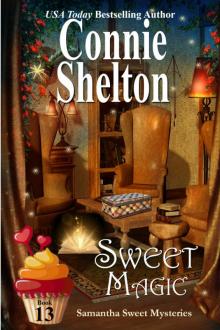 Sweet Magic
Sweet Magic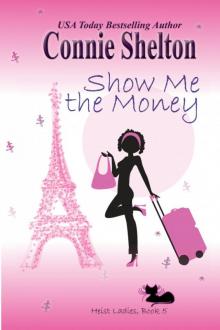 Show Me the Money
Show Me the Money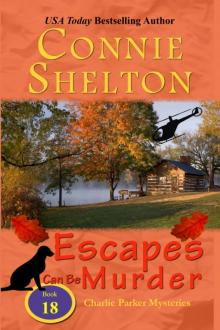 Escapes Can Be Murder
Escapes Can Be Murder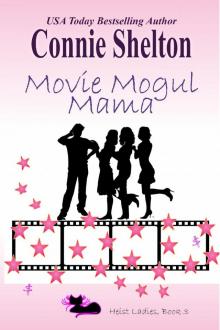 Movie Mogul Mama
Movie Mogul Mama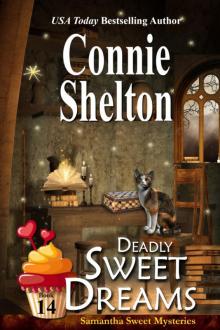 Deadly Sweet Dreams
Deadly Sweet Dreams Phantoms Can Be Murder: Charlie Parker Mystery #13 (The Charlie Parker Mystery Series)
Phantoms Can Be Murder: Charlie Parker Mystery #13 (The Charlie Parker Mystery Series)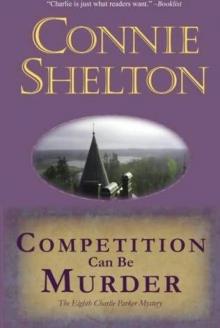 Competition Can Be Murder
Competition Can Be Murder Sweet Holidays: The Third Samantha Sweet Mystery (The Samantha Sweet Mysteries)
Sweet Holidays: The Third Samantha Sweet Mystery (The Samantha Sweet Mysteries)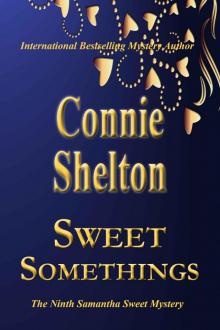 Sweet Somethings (Samantha Sweet Mysteries)
Sweet Somethings (Samantha Sweet Mysteries)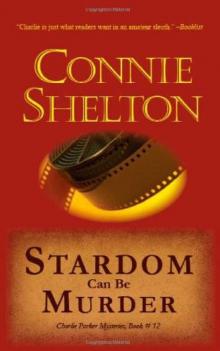 Stardom Can Be Murder: Charlie Parker Mystery #12
Stardom Can Be Murder: Charlie Parker Mystery #12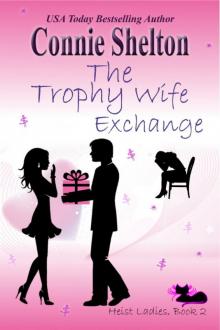 The Trophy Wife Exchange
The Trophy Wife Exchange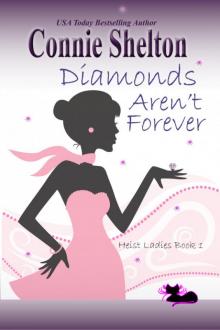 Diamonds Aren't Forever
Diamonds Aren't Forever Sweet Masterpiece
Sweet Masterpiece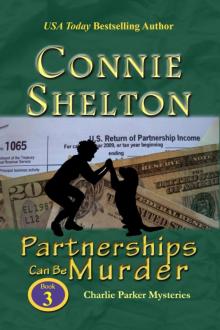 Partnerships Can Be Murder
Partnerships Can Be Murder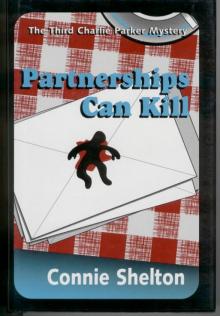 Partnerships Can Kill: The Third Charlie Parker Mystery
Partnerships Can Kill: The Third Charlie Parker Mystery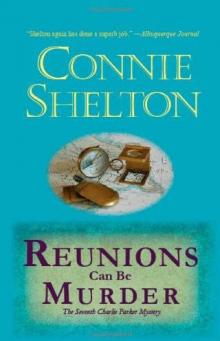 Reunions Can Be Murder: The Seventh Charlie Parker Mystery
Reunions Can Be Murder: The Seventh Charlie Parker Mystery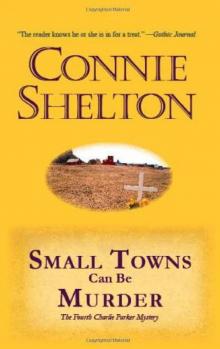 Small Towns Can Be Murder
Small Towns Can Be Murder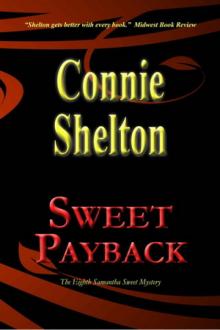 8 Sweet Payback
8 Sweet Payback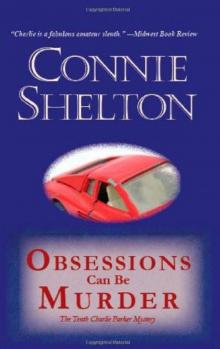 Obsessions Can Be Murder: The Tenth Charlie Parker Mystery
Obsessions Can Be Murder: The Tenth Charlie Parker Mystery 7 Sweets, Begorra
7 Sweets, Begorra Phantoms Can Be Murder: Charlie Parker Mystery #13
Phantoms Can Be Murder: Charlie Parker Mystery #13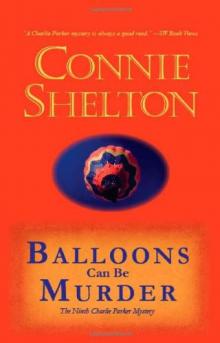 Balloons Can Be Murder: The Ninth Charlie Parker Mystery
Balloons Can Be Murder: The Ninth Charlie Parker Mystery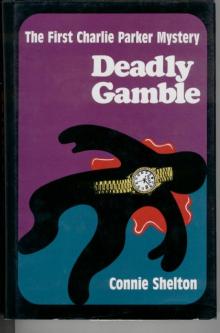 Deadly Gamble: The First Charlie Parker Mystery
Deadly Gamble: The First Charlie Parker Mystery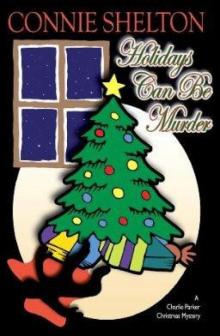 Holidays Can Be Murder: A Charlie Parker Christmas Mystery
Holidays Can Be Murder: A Charlie Parker Christmas Mystery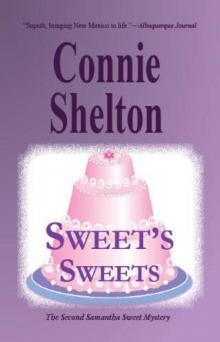 Sweet's Sweets: The Second Samantha Sweet Mystery ssm-2
Sweet's Sweets: The Second Samantha Sweet Mystery ssm-2 Sweet's Sweets: The Second Samantha Sweet Mystery (The Samantha Sweet Mysteries)
Sweet's Sweets: The Second Samantha Sweet Mystery (The Samantha Sweet Mysteries) Sweet Masterpiece - The First Samantha Sweet Mystery
Sweet Masterpiece - The First Samantha Sweet Mystery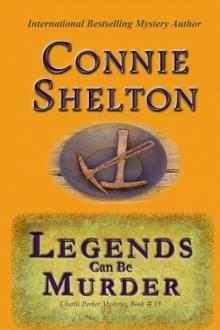 15 Legends Can Be Murder
15 Legends Can Be Murder Sweet Masterpiece: The First Samantha Sweet Mystery ssm-1
Sweet Masterpiece: The First Samantha Sweet Mystery ssm-1 Sweets Forgotten (Samantha Sweet Mysteries Book 10)
Sweets Forgotten (Samantha Sweet Mysteries Book 10)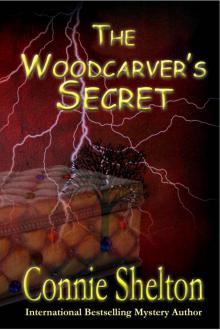 The Woodcarver's Secret (Samantha Sweet Mysteries)
The Woodcarver's Secret (Samantha Sweet Mysteries)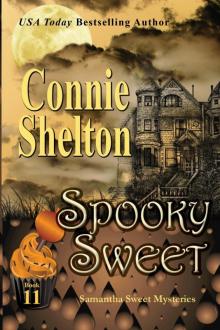 Spooky Sweet
Spooky Sweet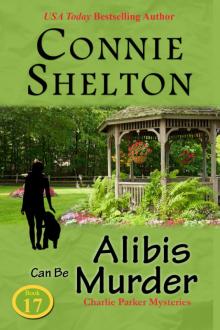 Alibis Can Be Murder
Alibis Can Be Murder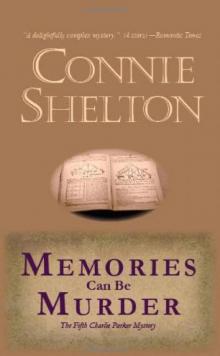 Memories Can Be Murder: The Fifth Charlie Parker Mystery
Memories Can Be Murder: The Fifth Charlie Parker Mystery Gossip Can Be Murder
Gossip Can Be Murder Honeymoons Can Be Murder: The Sixth Charlie Parker Mystery (The Charlie Parker Mysteries)
Honeymoons Can Be Murder: The Sixth Charlie Parker Mystery (The Charlie Parker Mysteries)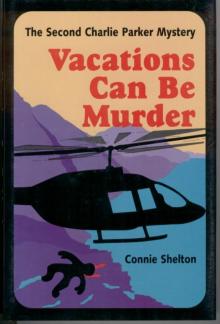 Vacations Can Be Murder: The Second Charlie Parker Mystery
Vacations Can Be Murder: The Second Charlie Parker Mystery Sticky Sweet
Sticky Sweet Sweet Hearts
Sweet Hearts